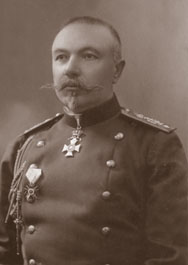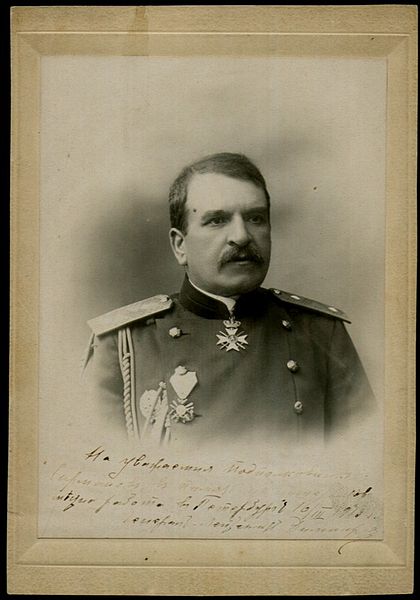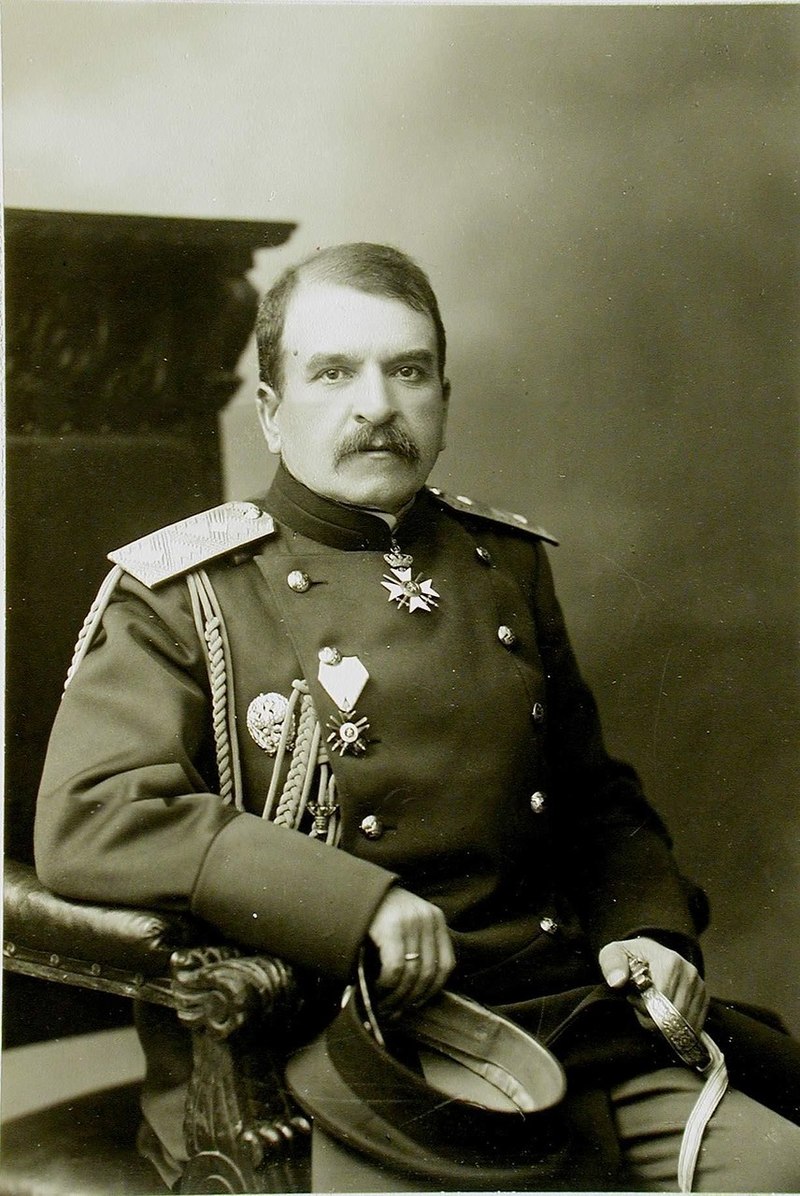<Back to Index>
- General of the Bulgarian Army Nikola Ivanov, 1861
- Lieutenant General of the Bulgarian Army Radko Dimitriev, 1859
PAGE SPONSOR

Nikola Ivanov (Bulgarian: Никола Иванов) (2 March 1861, Kalofer - 10 September 1940, Sofia) was a Bulgarian general, Chief of the Headquarters of the Bulgarian Army between 10 May 1894 and 29 November 1896, Minister of war from 29 November 1896 until 30 January 1899. He is prominent for capturing Adrianople in the First Balkan War and the subsequent encirclement by the Greek army in the Battle of Kresna Gorge which brought the end of the disastrous Second Balkan War.
Nikola Ivanov was born on 2 March 1861 in Kalofer. He studied in the Aprilov National High School in Gabrovo and then in the Imperial lyceum Galasaray in Istanbul (1875 - 1877). He participated in the Russo - Turkish War (1877 - 1878) as a volunteer. After the war he stayed for a short time in Plovdiv before going to the Military School in Sofia in 1878 from which he graduated the next year. On 22 May 1879 he was promoted to Lieutenant. In the same year he was appointed in the Eastern Rumelia militia as a junior officer and served in 1st and 2nd Plovdiv Company. On 9 February 1881 he was promoted to First Lieutenant.
He participated in the Unification of Bulgaria. On 9 September 1885 he was promoted to Captain and per Order No. 4 was appointed commander of the Tarnovo - Seymen Detachment on the same day.
During the Serbo - Bulgarian War in 1885 he worked under the commander of the Central Column of the Western Detachment. He participated in the Battle of Pirot on 14-15 November.
After the war in 1886 he was appointed as Fligel Adjutant of Knyaz Alexander Batenberg and after that as Chief of the Building Inspection department on the Ministry of Defense. On 1 April 1887 he was promoted to Major. In 1888 he was commander of the 10th Infantry Regiment, in 1889 he was chief of staff of the 4th Brigade and in 1890 of the 4th Cavalry Regiment. On 2 August he was promoted to Lieutenant Colonel. After that he was assistant to the Chief of Staff of the Army (1891-1894) and then Chief of Staff (1894 - 1896). On 2 August 1895 he was promoted to Colonel. Between 17 November and 29 November 1896 he was temporarily in charge of the Ministry of Defense.
Nikola Ivanov was a Minister of Defense in the Government of Konstantin Stoilov (1896 - 1899), commanded the 4th Preslav Infantry Division (1899 - 1903) and the 2nd Thracian Infantry Division (1903 - 1907). On 15 November 1900 he was promoted to Major General. From 1907 he was appointed as head of the 2nd Military inspection region.
To celebrate the 25th anniversary of his arrival in Bulgaria, Tsar Ferdinand promoted six Major Generals to Lieutenant General on 2 August 1912 and Ivanov was one of them. This was the first time in the Third Bulgarian Kingdom when that rank was given to active officers.
During the First Balkan War Nikola Ivanov commanded 2nd Army between September 1912 and July 1913. He was in charge of the siege and capture of Adrianople.
During the Second Balkan War in 1913 the outnumbered 2nd Army engaged in fierce battles against the whole Greek army and had to retreat after the Battle of Kilkis - Lahanas and later stopped and surrounded the Greeks in the Battle of Kresna Gorge. Ivanov was substituted in the command of the 2nd Army in July 1913 and on 7 August after the ceasefire he resigned from the army.
During the First World War he remained in the reserve. At that time he acted as a public figure and publicist. He was elected chairman of the Club of reserve officers in Sofia. On 6 May 1936 he was promoted to General of the Infantry.
General Nikola Ivanov died on 10 September 1940 in Sofia.


Radko Dimitriev (Bulgarian: Радко Димитриев) (24 September 1859, Gradets - 18 October 1918, near Pyatigorsk) was a Bulgarian General, Head of the General Staff of the Bulgarian Army from 1 January 1904 to 28 March 1907.
He was born in the village of Gradets (Sliven Province) and was raised by his grandmother in Kotel. He later studied in the Aprilov Gymnasium in Gabrovo and participated in the organization of the April Uprising (1876).
During the Russo - Turkish War (1877 - 1878) he was a translator in the 2nd Guards Division of the Russian Army. In 1879 he graduated from the Military School in Sofia; in 1881 Dimitriev was promoted to a Lieutenant and in 1884 he became Captain after graduating from the Saint Petersburg Academy. When only a captain he was one of the pro-Russian officers involved in the plot to kidnap Prince Alexander of Battenberg and force his abdication in 1886, for which he was exiled by Prime Minister Stefan Stambolov. He then served for ten years in the Russian army, and only returned to Bulgaria after the fall of Stambolov.
During the Serbo - Bulgarian War (1885) Dimitriev was one of the commanders of the Western Corps and participated in the successful battle of Pirot. After the war he took part in an unsuccessful coup d'état; emigrated to Romania and became a member of the club of the Emigrant Officers. Later he emigrated to Russia and served in the Russian Army.
He returned to Bulgaria in 1898 and became second in command in the 5th Danube Infantry Division. On 18 May 1900 he was promoted a Colonel and served as Head of the General Staff of the Bulgarian Army from 1904 to 1907. On 2 August 1912 Radko Dimitriev was promoted a Lieutenant General.
During the First Balkan War (1912 - 1913) he was in command of the 3rd Army which decisively defeated the Turks at Lozengrad and Lule Burgas in Thrace.
During the Second Balkan War in 1913 he replaced general Mihail Savov as deputy commander - in - chief. Later that year after the end of the war he was sent as a Minister Plenipotentiary to Saint Petersburg, Russia.
During the First World War (1914 - 1918) he served in the Russian Army as a commander of a corps. At the beginning of spring 1915, Radko Dmitriev commanded the 3rd Army in Galicia facing the Austrians along the line of Gorlice - Tarnów. His role was to hold the line while the Russian 11th and 12th armies in Bukovina renewed the offensive through the Carpathians towards Hungary. In April 1915 despite knowing that German troops had replaced those of Austro - Hungary in the area of Gorlice, Radko Dmitriev had made no preparations to counter a German offensive or fortify his positions. The trenches in his sector were crude and in many places there was no back-up line of defense. In the breakthrough area of Gorlice 5˝ Russian divisions (60,000) of poorly trained conscripts faced 10 German divisions of the 11th army under Mackensen with 700 guns including many of heavy caliber, while the Russians had only 140 light field guns. The concentrated bombardment which opened the Gorlice - Tarnów offensive on 2 May 1915 tore the front open, but initially General Alexeev at Stavka refused to take the offensive seriously: Stavka remained convinced that the main German attack would come from the north, and were focused on their own offensive in the south. A Russian counter attack was ordered by Stavka and took place at Dokra Pass on 7 May 1915 but this became a senseless massacre. Consequently much of the 3rd Army was either cut off or destroyed by the time Stavka allowed Radko - Dmitriev to order a retreat on 10 May 1915, and only 40000 out of an army of 200,000 reached the River San. Radko Dmitriev claimed correctly that his army had been “bled white” but was removed from command 2 June 1915 and replaced by General Lesh.
Sir Bernard Pares who met Radko Dmitriev several times when he was covering the war on the Eastern Front, and knew him well, described him thus:
"General Radko Dmitriev is a short and sturdily built man with quick brown eyes and a profile reminiscent of Napoleon. He talks quickly and shortly, sometimes drums on the table with his fingers, and now and then makes a rapid dash for the matches. The daily visit of the Chief of the Staff is short, because, as the General says on his return, simple business is done quickly. Every piece of his incisive conversation holds together as part of a single and clear view of the whole military position, of which the watchword is 'Forward'."
After a spell in the Caucasus out of favor, he was reappointed in late 1916 to command the 12th army on the Riga front, but in summer 1917 Alexeyev dismissed his commander - in - chief at the front, Ruszky, and the army commander Radko Dmitriev, for weakness and indulgence to the soldiers' committees that had sprung up everywhere after the February Revolution in 1917. Radko Dimitriev resigned and went with family to the resort town of Pyatigorsk in Caucasus. There on 18 October 1918 he was shot down by communist soldiers together with 100 generals and officers.